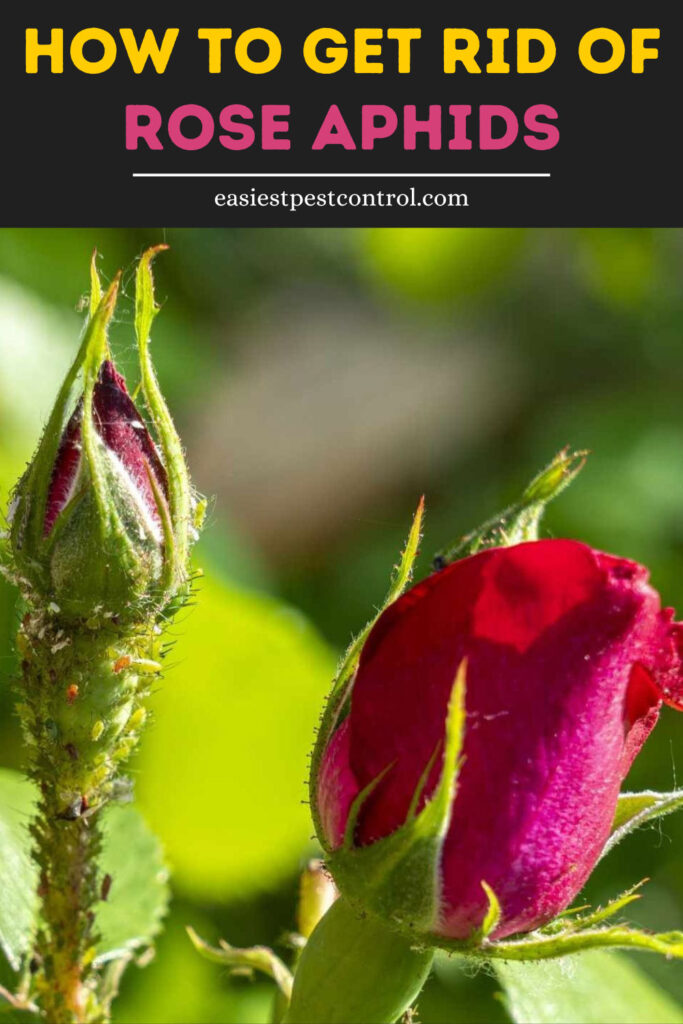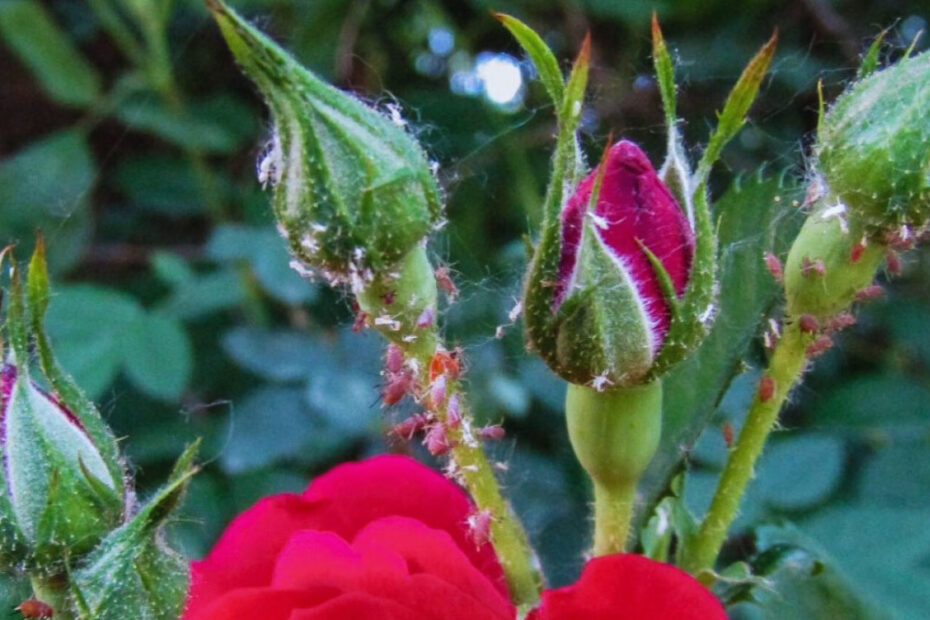If you’re a rose enthusiast, you know how disheartening it is to see your beautiful blooms under attack by aphids. These tiny pests can wreak havoc on your rose garden, causing leaves to curl and flowers to deform. But don’t worry, you can take effective steps to reclaim your garden.
Understanding how to get rid of rose aphids is crucial for maintaining the health and beauty of your roses. From natural remedies to chemical treatments, there are various methods to tackle these pesky invaders. Let’s explore the most effective strategies to ensure your roses thrive, free from aphid damage.
Key Takeaways
- Understanding Rose Aphids: Rose aphids, small insects feeding on rose plant sap, can cause significant damage, including distorted growth and yellowing leaves. Early detection is vital for effective management.
- Natural Remedies: Introducing beneficial insects like ladybugs and lacewings, or using homemade sprays such as soap and water, neem oil, and garlic and onion sprays can help control aphid populations in an eco-friendly manner.
- Chemical Solutions: Insecticidal soaps and systemic insecticides offer immediate and long-term protection against rose aphids. These solutions can be particularly effective when natural methods are insufficient.
- Preventative Measures: Regular inspections and proper plant care, including balanced fertilization, appropriate watering, and timely pruning, are essential to prevent and manage aphid infestations, ensuring the health of your rose garden.

Understanding Rose Aphids
Rose aphids, often tools of garden destruction, represent a significant threat to roses. It’s crucial to know these tiny invaders to combat them effectively.
What Are Rose Aphids?
Rose aphids, or Macrosiphum rosae, are small insects that feed on rose plant sap. They usually appear in green, pink, or brown colors. They prefer tender plant parts like buds, shoots, and leaves.
Key Characteristics:
- Size: About 1/8 inch long
- Color: Typically green but can be pink, brown, or black
- Shape: Pear-shaped bodies with long legs and antennae
Rose aphids reproduce rapidly, often giving live birth to nymphs. Within a week, these nymphs mature and start the cycle anew.
Signs of Aphid Infestation
Detecting an aphid infestation early can save your roses from severe damage.
- Distorted Growth: Leaves and flower buds may curl, wrinkle, or appear stunted.
- Sticky Residue: Aphids excrete honeydew, a sugary liquid that attracts sooty mold and ants.
- Visible Clusters: Look for groups of aphids on new growth, beneath leaves, or on buds.
- Yellowing Leaves: Infested leaves may turn yellow and drop prematurely.
Regular inspection of your rose plants will help identify these signs promptly. Act quickly at the first sign of infestation to protect your roses.
By understanding rose aphids and recognizing the symptoms of infestation, you can take targeted actions to manage these persistent pests effectively.
Natural Remedies
You can use natural remedies to control rose aphids without resorting to harsh chemicals. These methods are effective and eco-friendly, helping maintain your garden’s health.
Beneficial Insects
Introducing beneficial insects can naturally reduce aphid populations.
- Ladybugs: These insects consume large quantities of aphids. Release them in the early morning or late evening when temperatures are cooler.
- Lacewings: Known for their larvae, which are voracious aphid eaters. Purchase lacewing eggs and place them near infested plants.
- Parasitic Wasps: These tiny wasps lay eggs inside aphids, causing them to die. Release parasitic wasps in your garden to target aphid populations.
These insects can provide long-term control if you create a welcoming habitat for them.
Homemade Sprays
Homemade sprays can deter or kill aphids without harming your roses.
- Soap and Water Spray: Mix 1 tablespoon of dish soap with 1 quart of water. Spray this solution on affected parts of the plant. The soap suffocates aphids without damaging your roses.
- Neem Oil Spray: Combine 2 tablespoons of neem oil with 1 gallon of water. Neem oil disrupts the life cycle of aphids and prevents further infestations.
- Garlic and Onion Spray: Blend one onion and one garlic bulb with water, then strain the mixture. Spraying this solution on plants deters aphids due to its strong odor.
Apply these sprays early in the morning or late in the afternoon to avoid leaf burn from sunlight. Repeat applications every few days until the aphid population decreases.
Using these natural remedies, you can effectively manage aphid infestations and maintain a healthy rose garden.
Chemical Solutions
Chemical solutions offer effective means for managing rose aphids, especially when natural methods fall short. Selective application ensures minimal harm to beneficial insects and the environment.
Insecticidal Soaps
Insecticidal soaps work by disrupting aphid cell membranes, causing dehydration and death. These soaps are safe, biodegradable solutions focusing on immediate effects.
- Application: Mix according to package directions. Spray directly on aphids, covering undersides of leaves.
- Frequency: Apply every 5-7 days as needed until the aphid population decreases.
- Benefits: Safe for humans and pets, minimal environmental impact.
- Examples: Safer Brand Insect Killing Soap, Bonide Insecticidal Soap.
Systemic Insecticides
Systemic insecticides are absorbed by the plant, targeting aphids from within. These solutions offer longer-lasting protection by circulating through plant tissues.
- Application: Follow label instructions. Apply at the base of the plant or as a foliar spray.
- Frequency: Typically applied every few weeks or as specified by the product instructions.
- Benefits: Long-lasting protection, minimal impact on non-target insects.
- Examples: Imidacloprid-based products like Bayer Advanced 2-in-1 Systemic Rose and Flower Care.
Chemical solutions can effectively control rose aphids, providing targeted, sustainable relief. Use insecticidal soaps for immediate action and systemic insecticides for long-term protection.
Preventative Measures
Preventing rose aphids requires proactive strategies to maintain a healthy rose garden. By integrating regular inspections and proper plant care, you can significantly reduce the likelihood of infestations.
Regular Inspections
Frequent checks allow early detection and intervention:
- Inspection Frequency: Examine your roses weekly during the growing season.
- Key Areas to Check: Focus on new growth, buds, and undersides of leaves.
- Signs of Infestation: Look for clusters of aphids, sticky residue, distorted growth, and yellowing leaves.
Regular inspections enable you to spot aphids early and take immediate action to prevent significant damage.
Proper Plant Care
Healthy plants resist aphid infestations more effectively:
- Watering: Ensure consistent moisture but avoid overwatering, which can weaken plants.
- Fertilization: Use balanced fertilizers to provide essential nutrients without excessive nitrogen, which attracts aphids.
- Pruning: Remove infested or damaged parts promptly to prevent the spread of aphids.
Proper plant care fosters resilient roses that can withstand aphid pressures, contributing to a robust garden environment.
Conclusion
By implementing a combination of natural remedies and chemical treatments, you can effectively manage rose aphid infestations and protect your beloved roses. Regular inspections and proactive care are essential to catch early signs of aphids and prevent severe damage. Whether you choose to introduce beneficial insects or apply insecticidal soaps, these strategies will help you maintain a thriving and beautiful rose garden. Stay vigilant and consistent in your efforts, and your roses will reward you with their stunning blooms, free from the threat of aphids.
Frequently Asked Questions
What are rose aphids?
Rose aphids, or Macrosiphum rosae, are small, pear-shaped pests that vary in color. They prefer tender parts of the plant and can multiply quickly, causing damage to roses.
How can I identify an aphid infestation on roses?
Look for distorted growth, sticky residue, visible clusters of aphids, and yellowing leaves. Regularly inspect new growth, buds, and undersides of leaves to catch signs early.
Are there natural remedies to control aphids on roses?
Yes, beneficial insects like ladybugs and lacewings help reduce aphid populations. Homemade sprays, such as soap and water or neem oil, can also deter or kill aphids without harming the plants.
What chemical treatments are effective against rose aphids?
Insecticidal soaps and systemic insecticides are effective. Insecticidal soaps disrupt aphid cell membranes, while systemic insecticides provide longer-lasting protection by being absorbed by the plant.
How often should I inspect my rose plants for aphids?
Weekly inspections during the growing season are recommended. Focus on checking new growth, buds, and the undersides of leaves to detect early signs of infestation.
Can I prevent aphid infestations on my roses?
Yes, regular inspections, proper plant care, consistent watering, balanced fertilization, and timely pruning of infested parts can help maintain a healthy rose garden and reduce aphid risks.
